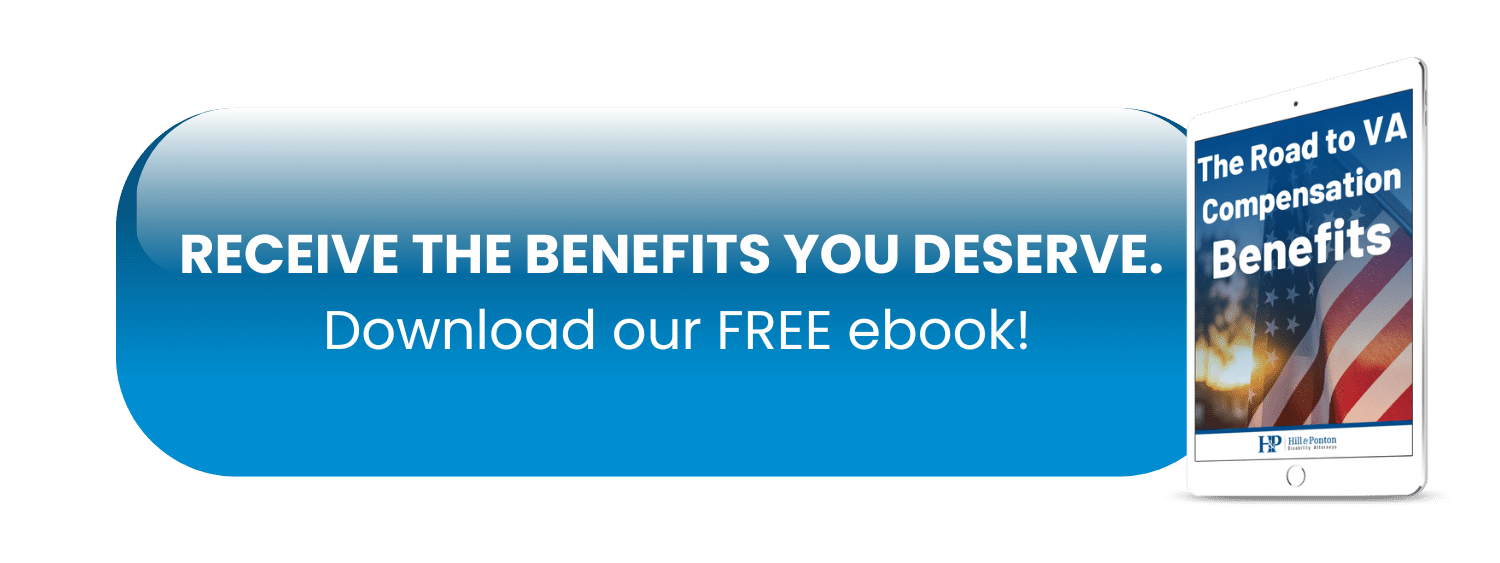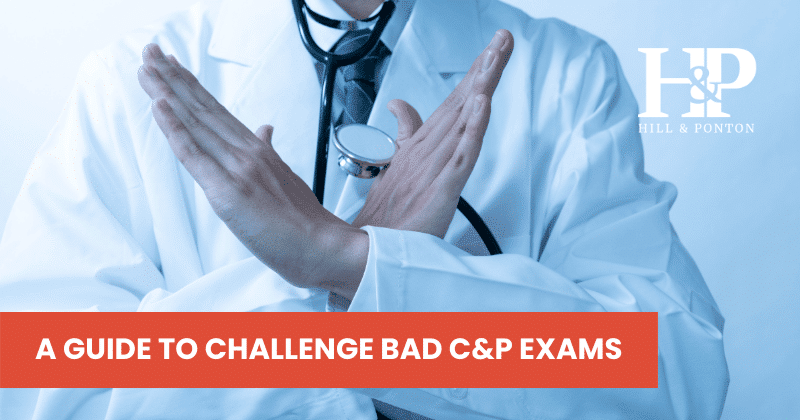After you file your disability benefits claim, The Department of Veterans Affairs (VA) may ask you to complete a Compensation & Pension (C&P) Exam.
This exam is meant to determine if you have a service-connected disability, and help the VA rate your disability, if you have one.
Your rating will be determined by how severe your disability is–and it will also impact how much disability compensation you’ll receive.
Compensation could include a variety of things, including monthly payments and enrollment in VA health care programs.
Because the C&P exam determines if you have a service-connected disability, and will also rate your disability, it is a critical part of the disability benefits claim process.
Oftentimes these examinations can go in your favor and provide much needed information to support your claim application, however, there are also instances where it may not go as well as planned.
In these cases, it is extremely important to understand the options available to you in regards to challenging and reporting bad C&P exams.
This guide will help you understand some ways you can proceed, should this happen to you.
Understand your part in identifying and reporting a bad exam.
One of the most important things to recognize if you have identified that your C&P examination did not go as planned, is the need to advocate for yourself.
In 2019, in a Supreme Court case known as Francway v. Wilkie, denied a challenge for veterans to be able to request that an examiner is not competent to perform a C&P examination.
In most cases, there likely would be the need for further legal representation in order to argue this.
In reality, what this means is that you must be vigilant with preparing for your C&P examination and carefully observing when you attend.
What are some examples of an inadequate C&P examination?
There are a variety of different circumstances that may indicate a bad C&P examination. Some of the most common and frequent reasons include:
- The length of the appointment–from the time you arrived in office, until the time you left
- The background knowledge of the examiner
- Whether or not the proper testing procedures and equipment was utilized
- Adherence to the Schedule of Ratings
- How the examination concluded
The length of the appointment.
This is an important factor to consider when evaluating whether a C&P exam went well or not.
It includes both potential circumstances–if you were waiting for a substantial amount of time, or if you were rushed through the entire process.
Take note of the time of your arrival, how much time you waited until you were called into the exam room, the length of the actual C&P exam, and then the time that you left the office.
Sometimes a shorter wait and exam time isn’t necessarily a bad thing, it is just dependent on what you are being seen for.
You should be aware of what you are being evaluated for and of potential testing and questions the C&P examiner might ask you, to help gauge if it was an appropriate length of time or not.
For example, if you had a psychiatric evaluation and it lasted for 10 minutes in total, it could definitely indicate something went wrong.
Typically, psychiatric evaluations take more time, however there may be some rare circumstances where this isn’t the case.
Generally speaking, you should try to be aware of what to expect ahead of time.
The background knowledge of the examiner.
Another important red flag that should be noted, is any background information you can acquire about your C&P examiner both before your exam and after.
The reasons being, is because the knowledge base of the individuals who are determining if you have a service-connected disability, and if so, what your rating should be, should be directly correlated with the disability you are being seen for.
For example, if you were being seen for hearing loss or tinnitus, you would most likely be visiting with an examiner who has background knowledge in Ear Nose and Throat (ENT) or audiology (AuD).
Therefore, if you end up seeing an examiner who specializes in occupational therapy (OT) for this condition, you may not be getting an objective opinion, as a result.
This means it’s important for you to be as mindful as possible about your examiner.
Whether or not the appropriate procedures and equipment were utilized.
As important as the knowledge of the examiner themselves, it is equally as important, if not more so, that the correct procedures and equipment were utilized throughout your exam.
If you were not tested with the proper procedures, or an examiner neglected to use a piece of equipment that was crucial in collecting data about your condition, it could be detrimental to the results of your C&P exam.
Going into your examination with some familiarity of your condition is extremely important, because it allows you to be able to identify, at least to some degree, if something seems off about the testing being performed.
Adherence to the Schedule of Ratings
By the time you attend your C&P Exam, you most likely will have a good understanding of what you are being seen for, and potentially being rated for. If you need more information about this, you can check out our VA Disability Compensation Calculator.
As mentioned above, understanding what you are being rated for and about your condition, will allow you to better understand and be prepared for the general way the exam should go.
Did the examiner perform the proper testing? Did they make correct records? Do they seem to understand how to report those records? All of these things are major factors that could determine the entire outcome of the C&P exam, and as a result, your disability claim.
How the examination concluded.
One final thing you should be aware of during your C&P examination, is how the actual visit concluded.
This may seem possibly irrelevant, but this information could be very beneficial in shedding light on a variety of the aforementioned circumstances regarding a bad exam.
For instance, the examiner should always ask you if you have any questions regarding the exam process or in general about your condition.
If you came prepared and noticed that a particular procedure wasn’t completed, or information wasn’t recorded–ask why!
By asking questions of the examiner, you’ll get a better understanding of how the C&P exam actually went, and hopefully, if they seem like they will be in your favor or not.
The answers might be generic and vague, but the more thorough they are, and you are, the better.
What can you do about a bad C&P exam?
While it may seem overwhelming and frustrating if an examination did not end up going favorably, don’t lose hope!
There are a variety of ways you can take action following a C&P exam. Some steps may include:
- Getting the name and specialization of your examiner.
- Find our any additional information regarding the examiners specialization or experience (sometimes Google can be a helpful resource for this)
- Write out a Memorandum for Record (MFR) and detail why the examiner was bad
- Call the VA to lodge a formal complaint at 1-800-827-1000
- Read the VA your MFR and request for another C&P exam
- Upload your MFR to your claim application
- Consider leaving a review of the doctor who performed the exam in order to help warn other veterans or patients in the future
The MFR is a letter in which you detail what went wrong during the exam. This should be an objective and factual document, where you are listing specific occurrences and observations.
This letter should be completed on VA Form 21-4138.
In conclusion, there are unfortunate circumstances in which a bad C&P exam can occur.
It is important for you to be aware of the steps you need to take, and the things to look for, in order to advocate for yourself if this happens.
Remember, that reporting a bad C&P examination could delay your claim decision, but if you strongly believe that something went wrong with the exam, it is important to consider your options.
A C&P is a critical component of the VA disability claims process and should not be overlooked.
If you are interested in learning more about filing for disability benefits, check out our FREE ebook The Road to VA Compensation Benefits.





